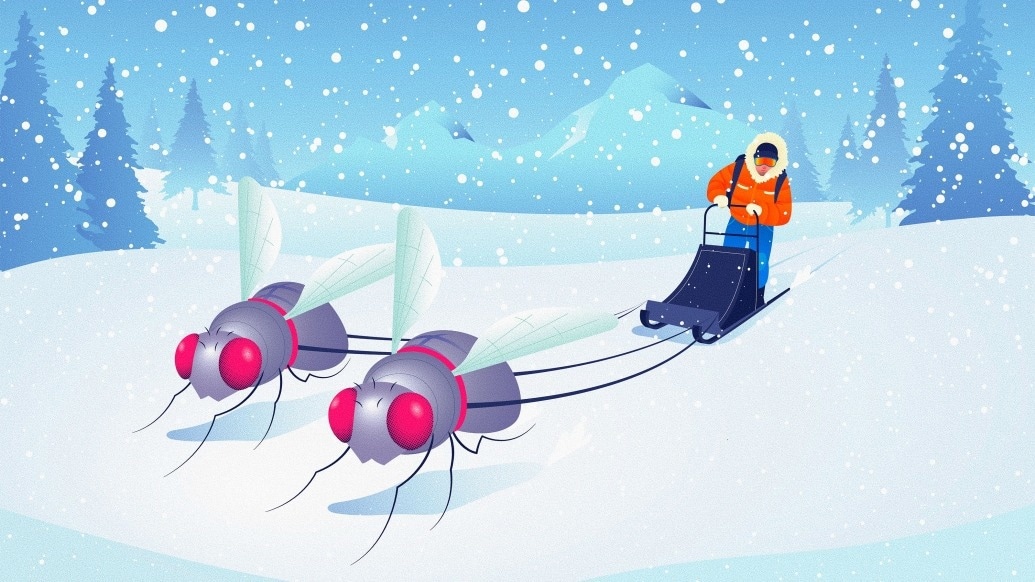Reviewed by Danielle Ellis, B.Sc.Sep 19 2023
As the northern hemisphere experiences shorter and colder days, individuals who prefer morning workouts may encounter increased difficulty in getting up and running.

Image Credit: Jacob Dwyer, Michigan Medicine
A research study published in the Proceedings of the National Academy of Sciences (PNAS) has pinpointed a protein that, in its absence, intensifies the challenges of exercising in cold conditions—at least, this is true for fruit flies.
Researchers from the University of Michigan Medical School and Wayne State University School of Medicine stumbled upon this protein in fruit flies during their investigation into metabolism and the impact of stress on the body. They aptly named the protein Iditarod after the famous long-distance dog sled race across Alaska.
The research had a particular focus on the physiological process known as autophagy, which involves the removal of damaged cellular components from the body. During their investigation of the fly genome, they identified a potential candidate responsible for regulating this crucial housekeeping process.
To establish the connection between autophagy and Iditarod, or Idit for short, they conducted experiments involving the genetic manipulation of certain flies to induce an overactivation of autophagy specifically in their eyes.
Flies with excessive autophagy experienced significant cell death, resulting in visible degeneration of their eye structures. However, when the Idit gene was deactivated, the normal eye structure was restored, clearly indicating the involvement of the Idit gene in the autophagy process
The team’s subsequent objective was to identify a similar gene, or homolog, in humans.
When we queried this gene in the human genome, a gene called FNDC5, which is a precursor to the protein irisin, was the top hit.”
Jun Hee Lee PhD, Department of Molecular and Integrative Physiology, University of Michigan
Previous scientific investigations have already established the significance of a hormone called irisin in mammals. This hormone plays a pivotal role in generating musculoskeletal benefits from exercise and also contributes to the body's ability to adapt to colder temperatures.
Dr Lee’s laboratory had already expressed a keen interest in studying exercise as a mild form of physiological stress.
We realized this gene may be also important for exercise and if so, we should be able to detect a similar physiological effect in flies.”
Jun Hee Lee PhD, Department of Molecular and Integrative Physiology, University of Michigan
Working alongside Robert Wessells’ team at Wayne State University, the researchers devised a clever method to train fruit flies. They used a special apparatus that mimics a climbing challenge, taking advantage of the flies’ natural tendency to climb upwards when placed in a test tube.
Their investigation revealed that flies bred without the Idit gene showed reduced endurance during exercise and did not experience the usual improvements from training.
Additionally, in mammals, a hormone called irisin is known to boost processes that generate heat, crucial for resisting the cold. Interestingly, the flies lacking the Idit gene also struggled to tolerate cold temperatures.
This discovery indicates that this particular gene family, which is found in both invertebrates like flies and mammals like humans, has been preserved over evolutionary time and plays a significant role in human bodies.
We believe that exercise helps clean the cellular environment through autophagy. When you are exercising hard, there is damage to the muscle and some of the mitochondria will malfunction. The autophagy process becomes activated to clean up any damaged organelles or toxic byproducts, and Idit gene seems important in this process.”
Jun Hee Lee PhD, Department of Molecular and Integrative Physiology, University of Michigan
Source:
Journal reference:
Cobb, T., et al. (2023) Iditarod, a Drosophila homolog of the Irisin precursor FNDC5, is critical for exercise performance and cardiac autophagy. Proceedings of the National Academy of Sciences. doi.org/10.1073/pnas.2220556120.